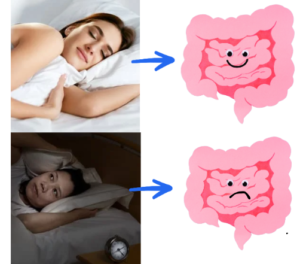Unveiling the Critical Relationship Between Quality Sleep and Digestive Health
Sleep functions as more than just a restorative period; it serves as a fundamental process that profoundly impacts our digestion and overall well-being. The intricate relationship between sleep and digestive health encompasses various physiological mechanisms that work in synchronisation. Central to this interaction is the body’s circadian rhythm, which regulates both sleep cycles and digestive activities. This harmony elucidates why individuals often experience hunger at similar times each day, showcasing the body’s remarkable ability to align with natural biological cycles.
Understanding the Importance of Restorative Sleep for Optimal Digestive Functionality 
Sleep is essential for the body’s ability to heal, rejuvenate, and restore itself effectively. The deeper stages of sleep hold particular significance for these restorative functions. During these crucial phases, the organs, tissues, and cells comprising the digestive system not only undergo relaxation but also engage in vital repair processes. The body prioritises cellular repair and growth during deep sleep, especially concerning the regeneration of the cells lining the digestive tract, which face continuous stress from food particles and digestive enzymes. This cellular regeneration is pivotal for maintaining the integrity of the gastrointestinal lining, thereby enhancing the efficiency of digestion and overall gut health.
Deep sleep also plays a crucial role in strengthening the immune system, which is particularly important for the digestive system, as it contains specialised immune cells activated by the beneficial bacteria residing in the gut. These immune cells are indispensable in protecting the gut and the entire digestive system from harmful microorganisms, ensuring a balanced population of bacteria within the gut ecosystem, ultimately fostering a healthy microbiome.
Furthermore, the organs within the digestive system play a vital role in detoxification, assisting in the removal of waste and harmful substances from the body. Deep sleep enhances this detoxification process by boosting the operational efficiency of the liver and kidneys, allowing these organs to function optimally. This synergistic relationship between sleep and detoxification is essential for achieving overall digestive health and wellness, highlighting the importance of quality sleep in maintaining bodily functions.
Investigating the Relationship Between Gut Motility and Sleep Patterns
A vital aspect of digestion involves the effective movement of food and waste through the digestive tract, a mechanism known as gut motility. This process undergoes significant alterations during sleep. Both deep and light sleep are characterised by a marked reduction in gut motility. This decrease is a necessary adaptation, allowing the digestive system to conserve energy, which can then be redirected towards repairing digestive tissues. Such energy conservation enables the digestive process to operate more effectively during waking hours, optimising both nutrient absorption and waste elimination.
The migrating motor complex represents a sequence of contractions that occurs during fasting periods, including during sleep. This cycle is crucial for gut motility, as it effectively clears away food particles and residues that might linger in the digestive system. This natural cleansing mechanism of the digestive tract significantly reduces the risk of bacterial overgrowth, thereby promoting a healthy gut environment. Importantly, the migrating motor complex is most actively engaged during the night when individuals are fasting and asleep, underscoring the vital role of sleep in safeguarding the health of the digestive system.
As the morning approaches, gut motility begins to increase, preparing the digestive system for the efficient processing and digestion of food. This rise in motility can also trigger the first bowel movement of the day, exemplifying the finely tuned relationship between sleep and gut motility. Gaining insight into this connection is crucial for optimising digestive health and enhancing overall well-being.
Investigating Hormonal Interactions Between Sleep and Digestive Health
Ghrelin, often known as the hunger hormone, plays a significant role in stimulating appetite. In contrast, leptin signals to the brain that the stomach is full, helping to prevent overeating. Collectively, these hormones are fundamental in regulating appetite, yet their functions can be negatively impacted by insufficient sleep.
Even a single night of poor sleep can lead to increased levels of ghrelin, heightening appetite and often resulting in cravings for carbohydrates. This experience is commonly described as feeling ‘hangry’. Compounding this issue, levels of leptin can decline following a night of inadequate sleep, disrupting the signals that indicate satiety. This creates a challenging scenario where individuals may overconsume and make unhealthy food choices while struggling to recognise their body's signals to cease eating. Whilst occasional poor sleep may not lead to severe consequences, chronic insomnia can result in significant digestive disorders, including gut inflammation, liver complications, gastroesophageal reflux disease, inflammatory bowel disease, and even colorectal cancer, in addition to contributing to weight gain.
Understanding the Consequences of Sleep Disruption on Digestive Well-Being
Disruptions to sleep can lead to a myriad of digestive issues. Factors such as shift work, particularly night shifts, and experiencing jet lag can severely disrupt sleep patterns and disturb the body’s internal clock. Moreover, late-night eating or irregular meal timings can adversely affect the quality of sleep. The circadian rhythm, which governs sleep, is closely tied to natural sunlight, essential for sustaining a healthy sleep-wake cycle.
Regrettably, in today’s tech-centric world, many individuals spend a considerable amount of their daytime indoors, resulting in decreased exposure to natural light. This shift has led to an increased exposure to blue light emitted by devices such as laptops, televisions, and smartphones, which further disrupts the sleep cycle and overall sleep patterns, particularly if this exposure occurs close to bedtime.
The cumulative effects of these factors can lead to serious digestive issues, including diarrhoea, ulcers, inflammatory bowel disease, or disruption of the delicate balance between beneficial and pathogenic bacteria in the gut. This imbalance can also compromise the gut lining, exacerbating concerns regarding digestive health and general well-being.
Enhancing Microbiome Health Through Quality Sleep Hygiene
The microbiome encompasses the trillions of microorganisms inhabiting the gut, predominantly consisting of beneficial bacteria known as probiotics, in addition to viruses, fungi, and potentially harmful bacteria. These microorganisms are integral not only to overall health but also to digestive health. They enhance immune responses and assist in the digestive process, facilitating the production of essential vitamins, enzymes, hormones, and amino acids. Recent studies have indicated a significant correlation between the microbiome and sleep, suggesting that disrupted sleep or chronic insomnia can negatively impact the balance of these microbes, ultimately affecting digestive health and overall vitality.
Exploring the Complex Interactions Between Microbiome Health and Sleep Quality
The connection between sleep and microbiome health is intricate and multifaceted. Poor sleep can negatively affect microbiome health, while an imbalanced microbiome can also detrimentally influence sleep quality. To better understand this complex interaction, one study revealed a correlation between a higher abundance of specific bacterial types in the gut and quicker sleep onset, along with fewer nighttime awakenings. While this article cannot explore all the findings in depth, the essential takeaway remains that promoting a diverse and abundant population of beneficial bacteria in the gut is critical for achieving optimal sleep, effective digestion, and maintaining overall health.
Investigating the Interconnection Between Stress, Sleep, and Digestive Health
A prevalent consequence of stress and anxiety is disrupted sleep. Conversely, these mental health concerns can also detrimentally affect the physical health and functionality of the digestive system. This disruption can lead to altered gut motility and contribute to complications such as indigestion, ulcers, and irritable bowel syndrome. A critical component of this dynamic is the influence of the so-called stress hormone, cortisol.
Examining How Cortisol Affects Digestive Processes
When cortisol levels surge, the body reacts by entering a fight-or-flight state. This physiological response involves redirecting blood flow to critical areas such as the heart, brain, lungs, and muscles, while diverting it away from the digestive system. This reaction prepares individuals to either confront threats or escape, a response that was vital for survival in ancient times.
In modern life, however, stressors are often less life-threatening, such as financial worries, work-related stress, or inadequate sleep. While acute situations may benefit from the temporary redirection of blood flow, chronic stress can have detrimental effects on the digestive system, particularly concerning gut motility. This state of chronic stress can manifest as symptoms including constipation, diarrhoea, indigestion, gas, and bloating. Thus, employing effective stress management techniques is essential for promoting both gut health and achieving quality sleep.
Ensuring adequate sleep is crucial for maintaining a healthy digestive system, as the relationship between sleep and digestion is inherently intertwined. Prioritising effective sleep hygiene practices is vital for achieving restorative sleep. This includes minimising exposure to blue light from electronic devices, maintaining a consistent sleep schedule, creating a cool, dark sleeping environment, avoiding food intake within two hours before bedtime, and ensuring adequate exposure to natural light during the day, especially in the morning.
References
Understanding Digestive Health and Circadian Rhythms
Exploring Sleep Dysfunction and Digestive Conditions
Examining the Link Between the Gut Microbiome and Sleep
Investigating Stress and Its Effects on the Digestive System
The Article: How Sleep Affects Your Digestive System appeared first on https://janestevensnutrition.com
The Article: Sleep’s Impact on Your Digestive System Explained appeared first on https://janestevens.net
The Article Sleep’s Impact on Digestive Health Explained Was Found On https://limitsofstrategy.com

